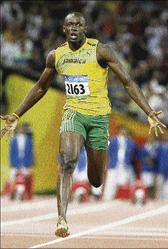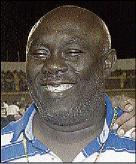Anthony Foster, Gleaner Writer

Usain Bolt reacts after winning the men's 100-metre final with a world record in Beijing. Just how much faster can he run the sprint? - File
GLEN MILLS, the coach of world double sprint record holder Usain Bolt, agrees his champion sprinter has not yet maximised his full potential. However, he is not reading too much into a recent biomechanic assessment made by Hans Eriksen, a physicist at the Institute of Theoretical Astrophysics at the University of Oslo, about his charge's potential speed.
Bolt shaved .03 seconds off his previous world record on his way to 9.69 Olympic glory, but Eriksen, in a report published by the Associated Press wire service last week, said if the sprinter had not slowed down as he started celebrating 20 metres from the finish line, he would have gone much faster.
"We estimate that he could have finished the race in a time between 9.55 and 9.61," the Norwegian physicist was quoted as saying in the report.
Analysis
It added that Eriksen and his colleagues analysed TV footage of the race, focusing on Bolt's position, speed and acceleration compared to second-place finisher Richard Thompson of Trinidad and Tobago.
Mills, who started to coach Bolt in 2004, says this was not the first time he had heard such projections.
"I was told by the technical director (Donald Quarrie) that when he spoke to the Chinese biomechanical people, they said that was the projection," said Mills, a top sprint coach from the 1970s.
He added: "That is just a projection, there is no accuracy or guarantee."
Mills, the 2005 joint Gleaner Man-of-The-Year, is well aware that Bolt is not at his best yet.

MILLS
Asked how fast he thinks Bolt can go, Mills replied: "I don't know, I don't know. He has not peaked yet, he is just 22. Within another two years he should peak." Mills also hinted a few things may change in the coming preseason for Bolt to run faster.
Impressive season
In the 2008 preseason, Bolt said he was "using the 100m as preparation to improve his 200m", but after an impressive season in both sprints, which brought respective world records of 9.69 and 19.30 and Olympic gold in the 100m, 200m as well as the 4x100m relay, that could well change.
"We have to evaluate what was done and the results. So it's something I will have to sit down and look at scientifically in the coming weeks before he starts training," said Mills.
"Yes, something will change and something will improve, but as for the specifics, I haven't looked at them yet."

